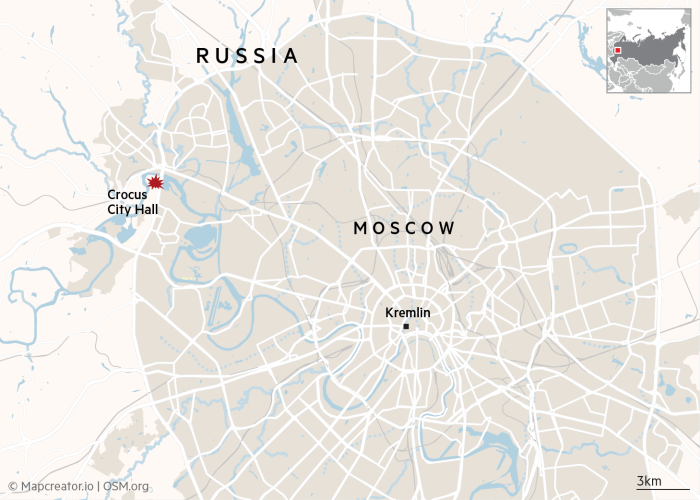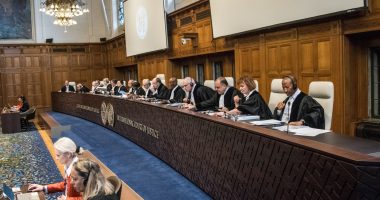At least 40 people died and more than 100 were injured after attackers opened fire at a large concert venue in Moscow late on Friday and a blaze took hold of the building.
At least four men dressed in camouflage burst into the Crocus City Hall concert venue on the outskirts of Moscow, where a band called Picnic was due to perform, the Ria state news agency reported, citing one of its reporters, who was a witness.
The shooting was the largest loss of life in a terrorist attack in Russia in at least a decade, and recalled the Islamist insurgencies that marked the first decade of president Vladimir Putin’s rule.
Russia’s Investigative Committee, a crimes unit, said more than 60 people died in the attack, adding that the total was likely to rise.
Russia’s national guard said “a search is ongoing” for the attackers. The assailants left the venue in a white Renault, according to state newswire RIA Novosti.
Putin heard reports from the heads of four Russian security agencies on the investigation into the attack, as well as officials in charge of efforts to help the victims, the Kremlin said in a late-night statement.
Earlier Kremlin spokesman Dmitry Peskov told reporters that the president was informed of the attack “within the first minutes” after it began and was “constantly receiving information about the events and the measures being taken from all the relevant agencies”, according to news agency Interfax. “All the essential instructions have been given by the president.”
News outlets on social media app Telegram posted graphic videos that appeared to show several people being killed by the unidentified men and cited unverified death tolls several times higher than the FSB’s.
Videos from outside the building showed an enormous blaze engulfing the roof, sending smoke billowing out into the night sky.
Officials described the attack as an act of terrorism. Some of them speculated that Ukraine, the country Russia launched a full-scale invasion against two years ago, was responsible, without providing any evidence. Kyiv immediately denied any involvement.
A US official said the US had no reason to doubt a claim from the Isis terror group that it was behind the attack. The FSB recently said it had broken up an Isis cell in Kaluga, a city south-west of Moscow.

Sergey Sobyanin, Moscow’s mayor, described a “horrible tragedy” in the venue and cancelled large-scale public events due to take place this weekend in the Russian capital. People were also evacuated on Friday night from big malls in some other Russian cities over fears of similar attacks.
The US embassy in Moscow said it was “shocked” by news of the attack and expressed “sincere condolences to the Russian people”.
Terror attacks rocked Russia in the 1990s and 2000s, mostly related to two bloody separatist wars in the southern republic of Chechnya, which formed the backdrop to Putin’s rise to power.
Friday’s attack will bring back memories for Moscow residents of the Nord-Ost siege, when Chechen fighters took hundreds of people hostage in a Moscow theatre in 2002, leading to the deaths of more than 170 people.
After Putin’s security services quelled Islamist insurgencies in Chechnya and neighbouring Dagestan, major attacks had largely subsided in the past decade, with the most recent coming in a 2017 suicide bombing in the St Petersburg metro that killed 15 people.
Earlier this month, the US government had information about a planned terrorist attack in Moscow — potentially targeting large gatherings — which prompted the state department to issue a public advisory to Americans in Russia. The US also shared this information with Russian authorities in accordance with its long-standing “duty to warn” policy, according to Adrienne Watson, a spokesperson for the National Security Council.
Six other western countries’ missions issued alerts in early March warning about attacks on public venues, including concerts, in the next 48 hours.
Putin dismissed what he said were “provocative statements” from the western embassies while speaking to Russia’s FSB security service on Tuesday.
“This all recalls outright blackmail and the intention to scare and destabilise our society,” Putin said, fresh from extending his 24-year rule until at least 2030 after last weekend’s presidential elections.
Videos posted on Russian social media after the attack showed men with automatic weapons roaming the lobby of the venue, driving screaming people into a corner, and shooting several of them at point-blank range.
Some people could be seen prostrate on the floor of the lobby, apparently after being shot.
Another video, taken by a concertgoer, showed seats on fire inside the hall, and people trying to flee as automatic fire was heard and smoke filled the room.
“I was in the lobby, I heard machine gun fire, the crowd was running out through the service entrance,” the Russian RBC magazine cited a concertgoer as saying. “There was a crush. Once on the street I heard the machine gun fire again.”
The FSB and Russia’s national guard stormed the building, where the attackers had holed up, according to state media. Videos showed emergency helicopters circling over the flaming roof.
Crocus City Hall is located just outside the perimeter of the Russian capital, and is a big concert venue close to an exhibition centre of the same name that regularly hosts conferences and other events.
The hall can host 6,200 people. Tickets for the concert by Picnic, an older- generation Russian rock band that began performing in 1978, were sold out.
Read More: World News | Entertainment News | Celeb News
FT










